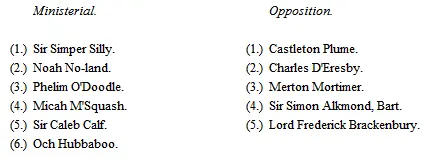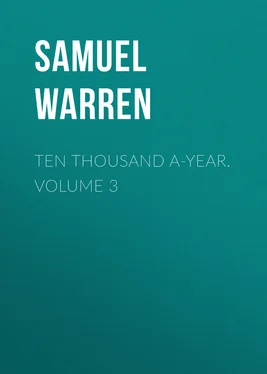Samuel Warren - Ten Thousand a-Year. Volume 3
Здесь есть возможность читать онлайн «Samuel Warren - Ten Thousand a-Year. Volume 3» — ознакомительный отрывок электронной книги совершенно бесплатно, а после прочтения отрывка купить полную версию. В некоторых случаях можно слушать аудио, скачать через торрент в формате fb2 и присутствует краткое содержание. Жанр: foreign_sf, foreign_antique, foreign_prose, на английском языке. Описание произведения, (предисловие) а так же отзывы посетителей доступны на портале библиотеки ЛибКат.
- Название:Ten Thousand a-Year. Volume 3
- Автор:
- Жанр:
- Год:неизвестен
- ISBN:нет данных
- Рейтинг книги:3 / 5. Голосов: 1
-
Избранное:Добавить в избранное
- Отзывы:
-
Ваша оценка:
- 60
- 1
- 2
- 3
- 4
- 5
Ten Thousand a-Year. Volume 3: краткое содержание, описание и аннотация
Предлагаем к чтению аннотацию, описание, краткое содержание или предисловие (зависит от того, что написал сам автор книги «Ten Thousand a-Year. Volume 3»). Если вы не нашли необходимую информацию о книге — напишите в комментариях, мы постараемся отыскать её.
Ten Thousand a-Year. Volume 3 — читать онлайн ознакомительный отрывок
Ниже представлен текст книги, разбитый по страницам. Система сохранения места последней прочитанной страницы, позволяет с удобством читать онлайн бесплатно книгу «Ten Thousand a-Year. Volume 3», без необходимости каждый раз заново искать на чём Вы остановились. Поставьте закладку, и сможете в любой момент перейти на страницу, на которой закончили чтение.
Интервал:
Закладка:
"'Pon my precious soul, I shall be ruined between you all!" gasped Titmouse, faintly.
"Sir, you're not the man I took you for," replied Mr. O'Gibbet, impatiently and contemptuously. "Don't you see a barleycorn before your nose? You'll be beat after spending three times the money I name, and be liable to ten thousand pounds' penalties besides for bribery"–
"Oh, 'pon my life, sir, as for that ," said Titmouse, briskly, but feeling sick at heart, "I've no more to do with it than—my tiger"–
"Bah! you're a babby, I see!" quoth O'Gibbet, testily. "What's the name o' your man o' business?—there's not a minute to lose—it's your greatest friend I mane to be, I assure ye—tut, what's his name?"
"Mr. Gammon," replied Titmouse, anxiously.
"Let him, sir, be with me at my house in Ruffian Row by nine to-morrow morning to a minute—and alone," said Mr. O'Gibbet, with his lip close to Titmouse's ear—"and once more, d'ye hear, sir?—a breath about this to any one, an' you're a ruined man—you're in my power most complately!"—With this Mr. O'Gibbet and Mr. Titmouse parted—the former having much other similar business on hand, and the latter determined to hurry off to Mr. Gammon forthwith: and in fact he was within the next five minutes in his cab, on his way to Thavies' Inn.
Mr. Gammon was at Mr. O'Gibbet's (of whom he spoke to Titmouse in the most earnest and unqualified terms of admiration) at the appointed time: and after an hour's private conference with him, they both went off to Mr. Flummery's official residence in Pillory Place; but what passed there I never have been able to ascertain with sufficient accuracy to warrant me in laying it before the reader.
When the day for taking into consideration the Yatton Petition had arrived—on a voice calling out at the door of the House, "Counsel in the Yatton petition!" in walked forthwith eight learned gentlemen, four being of counsel for the petitioner, and four for the sitting member—attended by their respective agents, who stood behind, while the counsel took their seats at the bar of a very crowded and excited House; for there were several election committees to be balloted for on that day. The door was then locked; and the order of the day was read. Titmouse might have been seen popping up and down about the back ministerial benches, like a parched pea. On the front Treasury bench sat Mr. O'Gibbet, his hat slouched over his fat face, his arms folded. On the table stood several glasses, containing little rolls of paper, each about two or three inches long, and with the name of every member of the House severally inscribed on them. These glasses being placed before the Speaker, the clerk rose, and taking out one or two of the rolls of paper at a time, presented them to the Speaker; who, opening each, read out aloud the name inscribed, to the House. Now, the object was, on such occasions, to draw out the names of thirty-three members then present; which were afterwards to be reduced, by each party alternately striking off eleven names, to ELEVEN—who constituted the committee charged with the trial of the petition. Now the astute reader will see that, imagining the House to be divided into two great classes, viz. those favorable and those opposed to the petitioner—according to whose success or failure a vote was retained, lost, or gained to the party —and as the number of thirty-three cannot be more nearly divided than into seventeen and sixteen, 't is said by those experienced in such matters, that in cases where it ran so close—that side invariably and necessarily won who drew the seventeenth name; seeing that each party having eleven names of those in his opponent's interest, to expunge out of the thirty-three, he who luckily drew this prize of the SEVENTEENTH MAN, was sure to have SIX good men and true on the committee against the other's FIVE. And thus of course it was, in the case of a greater or less proportion of favorable or adverse persons answering to their names. So keenly was all this felt and appreciated by the whole House on these interesting—these solemn , these deliberative , and JUDICIAL occasions—that on every name being called, there were sounds heard, and symptoms witnessed, indicative of eager delight or intense vexation. Now, on the present occasion, it would at first have appeared as if some unfair advantage had been secured by the opposition; since five of their names were called, to two of those of their opponents; but then only one of the five answered , (it so happening that the other four were absent, disqualified as being petitioned against, or exempt,) while both of the two answered!—You should have seen the chagrined faces, and heard the loud acclamations of "Ts!—ts!—ts!" on either side of the House, when their own men's names were thus abortively called over!—the delight visible on the other side!—The issue long hung in suspense; and at length the scales were evenly poised, and the House was in a state of exquisite anxiety; for the next eligible name answered to, would really determine which side was to gain or lose a seat.
" Sir Ezekiel Tuddington "—cried the Speaker, amid profound and agitated silence. He was one of the opposition—but answered not; he was absent. "Ts! ts! ts!" cried the opposition.
" Gabriel Grubb "—This was a ministerial man, who rose, and said he was serving on another committee. "Ts! ts! ts!" cried the ministerial side.
" Bennet Barleycorn "—(opposition)—petitioned against. "Ts! ts! ts!" vehemently cried out the opposition.
"Phelim O'Doodle"–
"Here!" exclaimed that honorable member, spreading triumph over the ministerial, and dismay over the opposition side of the House; and the thirty-three names having been thus called and answered to, a loud buzz arose on all sides—of congratulation or despondency.
The fate of the petition, it was said, was already as good as decided.—The parties having retired to "strike" 3 3 For this purpose each party, attended by their counsel, agents, and political friends, immediately withdrew to separate rooms, to fix upon the eleven names which they would strike off. Having done this, they met in a third room, before an officer of the House; and struck off name by name alternately, till the thirty-three were reduced to eleven.—This process was called " Knocking out the brains of the Committee :" for as each party's object was to get rid of a decided and known political opponent, the abler and more eminent he was, the greater the necessity for getting rid of him. Those left were the more obscure members of the House.
the committee, returned in about an hour's time, and the following members were then sworn in, and ordered to meet the next morning at eleven o'clock:—

And the six, of course, on their meeting, chose the chairman , who was a sure card—to wit, Sir Caleb Calf, Bart. 4
Mr. Delamere's counsel and agents, together with Mr. Delamere himself, met at consultation that evening, all with the depressed air of men who are proceeding with any undertaking contra spem . "Well, what think you of our committee?" inquired, with a significant smile, Mr. Berrington, the eloquent, acute, and experienced leading counsel. All present shrugged their shoulders, but at length agreed that even with such a committee, their case was an overpowering one; that no committee could dare to shut their eyes to such an array of facts as were here collected; the clearest case of agency made out—Mr. Berrington declared—that he had ever known in all his practice; and eleven distinct cases of BRIBERY, supported each by at least three unexceptionable witnesses; together with half-a-dozen cases of TREATING; in fact, the whole affair, it was admitted, had been most admirably got up, under the management of Mr. Crafty, (who was present,) and they must succeed.
Читать дальшеИнтервал:
Закладка:
Похожие книги на «Ten Thousand a-Year. Volume 3»
Представляем Вашему вниманию похожие книги на «Ten Thousand a-Year. Volume 3» списком для выбора. Мы отобрали схожую по названию и смыслу литературу в надежде предоставить читателям больше вариантов отыскать новые, интересные, ещё непрочитанные произведения.
Обсуждение, отзывы о книге «Ten Thousand a-Year. Volume 3» и просто собственные мнения читателей. Оставьте ваши комментарии, напишите, что Вы думаете о произведении, его смысле или главных героях. Укажите что конкретно понравилось, а что нет, и почему Вы так считаете.












